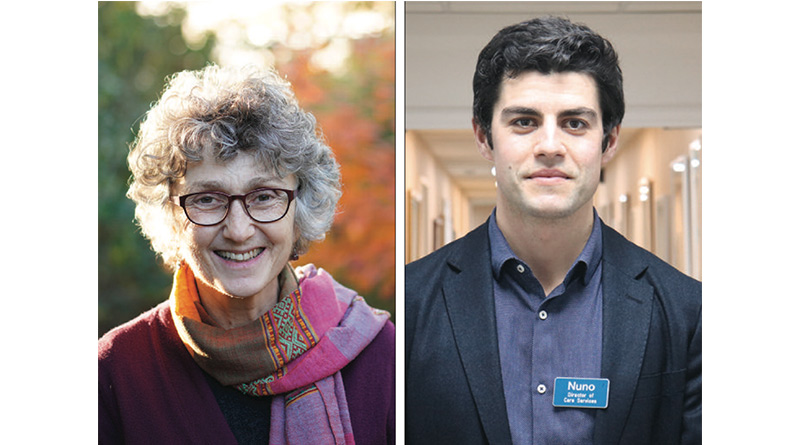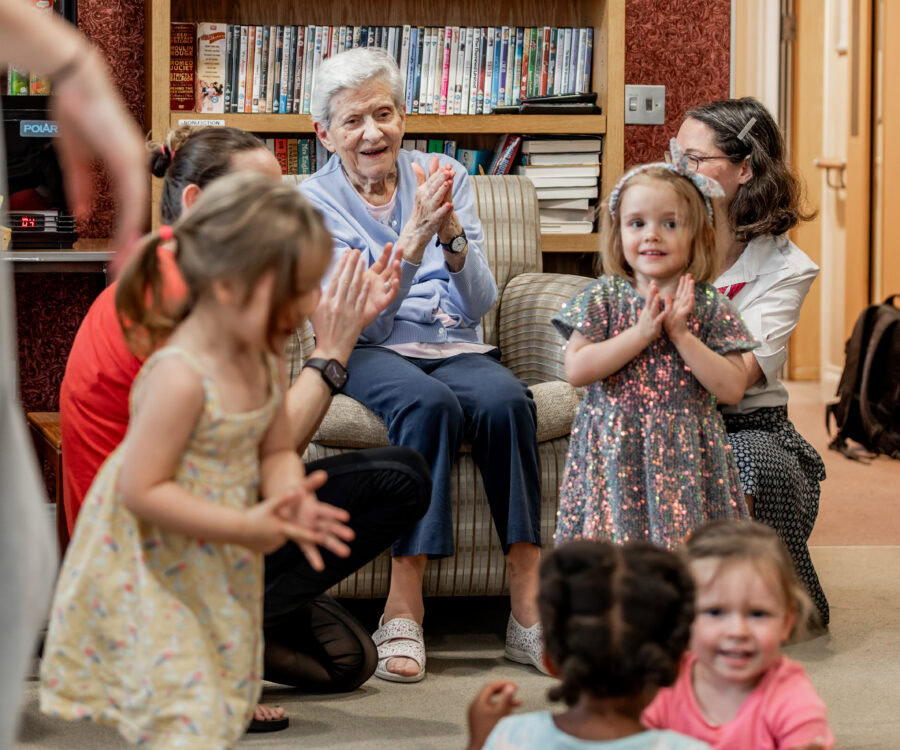

By Judith Ish-Horowicz MBE, Co-founder and Director, Apples and Honey Nightingale CIC (www.applesandhoneynightingale.com) & Nuno Lopes, Director of Care, Nightingale Hammerson (www.nightingalehammerson.org)
‘It makes me so joyful when we all get together’. So said one resident after an intergenerational zoom session at Nightingale Hammerson Care Home in South London.
Like many care homes across the world, we are always striving to push the boundaries and find the best ‘home from home’ approach we can. In 2017, we launched the UK’s first intergenerational care provision at Nightingale House by partnering with Apples and Honey Nightingale children’s nursery. Since the pandemic began, we have worked hard to maintain the friendships that had built up over the past 3 years since the pre-school opened and new relationships have been formed across the ether as children join the setting and Nightingale House welcomes new residents.
The benefits of intergenerational engagements have become even more apparent during this dreadful pandemic year when Care Home residents have suffered the loneliness and isolation that has resulted from the need to protect them. We have been in the privileged position of having daily interactions with our young pre-school friends who have continued to bring laughter and energy into our lives.
THE SIX FEATURES OF INTERGENERATIONAL CARE
In studies we have done, we have identified six features of the inter- generational sessions that residents particularly respond to. And it is important to note that we have found this to be regardless of cognitive ability, underlying health, or age.
1. Children themselves: Some residents really enjoy developing a relation- ship with the children and it is the simple interaction with them that has had the greatest impact.
2. Middle age demographic: The early years teachers, parent volunteers, or nursery parents and carers who regularly attend sessions with their children and chat to the residents.
3. Child-like setting: Some have found that the space filled with toys and music from early childhood particularly comforting and pleasurable to be in.
4. The activity itself: The intergenerational sessions are designed to deliver the Early Years Statutory Framework and so have learning and development at the core. This is an entirely new experience for older care home residents and stands out from the other engagement experiences on offer to them.
5. Leader of the session: Qualities of the professional leading the activity as an early years professional, who bring different skills to an intergenerational session.
6. Religious ceremony and celebration: As a care home for Jewish faith people, we found that some residents, particularly those with advanced dementia, had a strong reaction to either reliving a religious task or singing traditional Hebrew songs.
ADAPTING OUR PROGRAMME TO THE PANDEMIC GUIDELINES
When the pandemic first struck, everything stopped. The country was in lockdown and everyone was in shock. But as soon as the government permitted early years settings to re-open last June, the nursery and care staff began adapting their programme to ensure that we could continue to come together safely, in whatever medium or setting was both legal and safe. We started on zoom but soon progressed to socially distanced programmes in the garden. If rain interrupted play, we met in adjacent rooms with glass doors separating us physically, but not emotionally. Nursery families made videos of the children dancing and singing at home with messages for their friends in the home and residents learnt to use technology to research topics to help with the children’s learning.
Whilst not perfect, we know that these sessions have been crucial in raising the residents’ spirits, helping them to feel that they are not separate from the world around them, providing stimulation, variety, purpose and relationships. The impact on the emotional and physical wellbeing of the residents is clear to see. These intergenerational engagements have provided stimulation and purpose. The therapeutic value is undeniable.
The children, who have not been able to visit grandparents and great grandparents are also still benefitting from living in a multi-generational community. But they are not the only ones for whom these intergenerational engagements are a reassurance and relief. Nightingale Hammerson has been able to reassure the families of the residents, who have been unable to visit their loved ones, that they are still experiencing a dynamic and varied programme of interactions, despite the limitations of Covid. The home has been able to assuage feelings of anxiety and guilt at not being present and able to hug them’. And, for the care staff, our intergenerational sessions help them to provide the therapeutic stimulation of a varied programme within the confines of lockdown.
Our approach is that you are never too old to adapt or too young to ‘have a go’. We can’t wait till we can all come together again feely as before, singing on the minibus on our way to the Wetlands Centre or the library, cuddling on the sofa for our buddied reading sessions and having tea and cake in the café. With the support and determination of our residents and children, our intergenerational programme will continue to grow and evolve and respond to all challenges.
